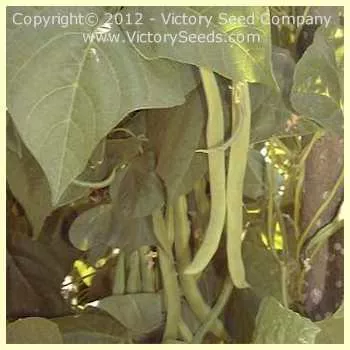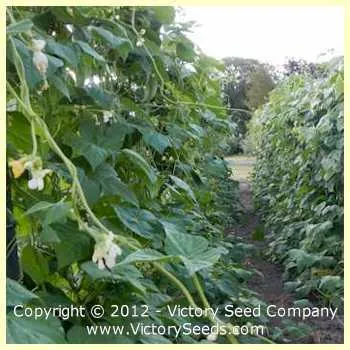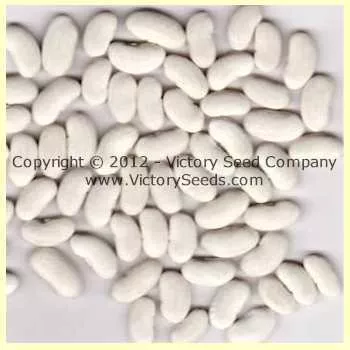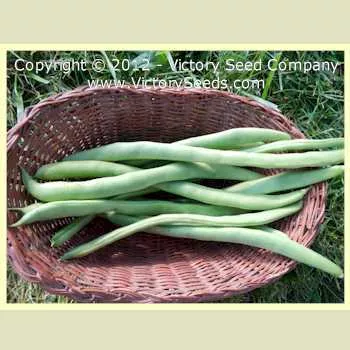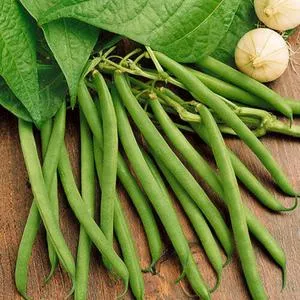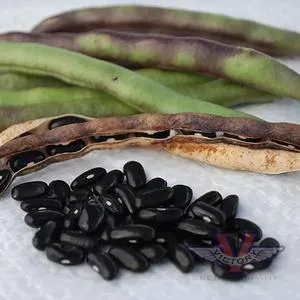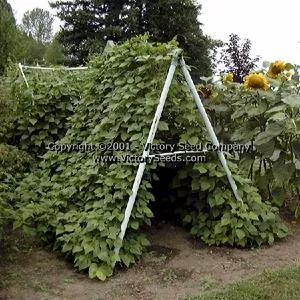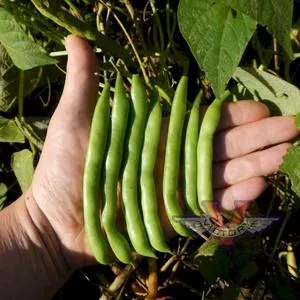



Potomac Pole Green Garden Bean
Price: $3.45
SKU: 3030941We were very excited to re-release this old variety in 2012. It is one that is connected to us with a bit of personal history. Back in 2004, we were contacted by bean variety conservationist and horticultural bibliophile named Mark Futterman, who at the onset of his end-of-life failing health, had the foresight to find homes for his life's work. (You can read more about the story and about his awesome donation to our horticultural library by clicking here.)
 Mark had searched for this variety for years. One day in 1988, while reading his local newspaper, he happened across an article about an elderly gardener named Gus W. Tompkins of El Sobrante, California. It went on to describe how Gus had received 'Potomac' seeds as part of a Victory Gardening offer from the Oakland [California] Tribune in 1941. Gus had been growing them ever since.Mark quickly contacted Gus, arranged a visit, and was able to acquire seeds. Mark was very excited about this discovery and was eager to share the bean with me in hopes that we would grow them out and reintroduce them to the gardening public.
Mark had searched for this variety for years. One day in 1988, while reading his local newspaper, he happened across an article about an elderly gardener named Gus W. Tompkins of El Sobrante, California. It went on to describe how Gus had received 'Potomac' seeds as part of a Victory Gardening offer from the Oakland [California] Tribune in 1941. Gus had been growing them ever since.Mark quickly contacted Gus, arranged a visit, and was able to acquire seeds. Mark was very excited about this discovery and was eager to share the bean with me in hopes that we would grow them out and reintroduce them to the gardening public.When I met with Mark he told me that 'Potomac' was, "the finest bean I have yet grown." Some years later, while reviewing his gardening notes, I found that he had backed up his statement by growing it out nearly every year since he obtained the seeds. 'Potomac' was bred and released by Associated Seed Growers, New Haven, Connecticut and was an "All-America Selection®" winner in 1943. It reportedly is resistant to common mosaic virus and some forms of rust.
[Note: Mark told me that there is another pole bean circulating, with the same name, but has dark seeds and is of a poorer quality. After doing some investigation, it was discovered that the dark seeded variety is an old Virginia family heirloom that was introduced in 1990 by SESE and inadvertently given an already used bean variety name. As far as we know, we are the only source (2012) for the original, white-seeded 'Potomac' variety.
We have been growing 'Potomac' off and on since 2005 and since its re-release, we have heard nothing but praise. However, we did receive one report this year (2014) from a customer who found an off-type plant growing in their patch. We grow our seed in isolation and have not experienced this phenomenon personally, however I wanted to mention this as a heads-up. We will continue to monitor and clean up the variety as necessary.]
Don’t bother trying to get an early start with beans – you’ll waste a lot of seed! Beans are a tender vegetable and you should not plant them until all danger of frost has passed and the soil remains above 65ºF. Sow seeds 1½ inches deep, every two to three inches. As they make efficient use of vertical space, provide a trellis. Use string or twine as wire will heat and burn the tender vines.
Pick the pods while young as they are more tender and succulent and less likely to be stringy. For seed saving, allow the pods to fully mature and dry completely out on the vines.
- Vegetable Cultivar Descriptions for North America: Bean - Green (M-Z), Lists 1-26 Combined
- AAS Winners 1933 to Present
- "Victorious Gardener"
Customer Reviews:
By Martin Valeri on January 2, 2021
I grew these up twine on the side of my house, and they reached the roof, pushing 15 feet. I was able to harvest some of the beans at an edible length, but they grew so fast that I blinked and the beans were 10 inches or more long, and big and fat and tough. The ones we ate fresh were good, but can't compete with the flavor of the french filet style beans I grew. I let the rest dry on the stalk and harvested a ton of dried beans in the fall. If you're looking for the most food per bean plant, this is for you. But be vigilant and harvest daily.
By Becki McDermott on June 21, 2016
We've been growing this bean for about three years now. For the area we live, it is an AMAZING bean. Beautiful vines that start out looking a bit scrawny, but then fill out and get very dense on our teepees. We sometimes end up with nine to ten foot vines, so we always put cross poles between the teepees.<br><br>The beans, at the suggested picking length don't have strings. I have let them get as long as eleven inches, but don't recommend it. They DO get stringy and a bit woody at that length. At eight to nine inches, they are stringless, crisp, full podded and oh! so tasty. Very prolific bean with well above average yields. This is our bean of choice as long as we continue to live where we do. We have limited space, so this is a perfect fit for us. A longer bean means fewer beans needed to fill the jars! EXCELLENT bean!!

